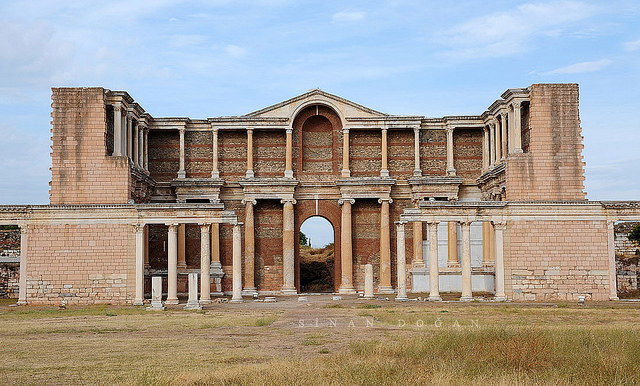« Relics from the largest known synagogue of antiquity will go on display next year in a museum in western Turkey » reports Murat Erdin in Al-Monitor.
A museum in western Turkey will soon exhibit artifacts from the largest known synagogue of the ancient world, uncovered fully after six decades of American-led excavations at what was once the seat of power of the fabulously rich King Croesus.
The monumental edifice emerged from the ruins of the ancient city of Sardis, the capital of the Lydian empire in the 7th and 6th centuries BC, when its kings, among them King Croesus, ruled over western Anatolia and minted the world’s first coins.
The excavations at the site – near the town of Salihli in Manisa province – have turned up remains from various epochs, including a section of the city’s famed citadel and a gold refinery from the Lydian period, a huge Ionic temple dedicated to Artemis and a Roman bath-gymnasium complex.
The synagogue, 120 meters long and 18 meters wide, was the center of Jewish religious life at Sardis during the late Roman period. Nearby Jewish cemeteries of more recent ages are the testament of a long Jewish presence in the region. About 50,000 Jews lived in Ottoman western Anatolia in the mid-19th century, including 2,000 in and around Manisa. No Jewish population remains today after migration during the First and Second World Wars and after the creation of Israel.
Jewish settlement in Sardis is believed to have started in the 3rd century BC, when the Seleucid King Antiochus III encouraged Jews from Babylon and elsewhere to settle in the city. The Seleucids took over Sardis after the death of Alexander the Great, who conquered the city from the Persians, the destroyers of the Lydian kingdom. Sardis was later absorbed into the Roman Empire. The 1st-century historian Josephus Flavius mentions Roman decrees confirming the religious rights of the Jews of Sardis. The synagogue, however, is believed to have been built much later, based on the discovery of 3rd-century coins beneath its floors.
The archeological work at the site has been headed by Prof. Nicholas D. Cahill of the University of Wisconsin-Madison since 2008.
Cahill told Al-Monitor the synagogue had been fully uncovered and current work focused on restoration and repairs. “It is the largest synagogue of the antiquity era,” he said.
All artifacts discovered in the synagogue will be displayed at the Manisa Museum once it reopens next year after renovation, officials told Al-Monitor.
Among major finds are fragments and images of menorahs, the multibranched candelabra used in Jewish religious rituals. During restoration work, the archeologists found 89 Roman-era inscriptions naming donors to the synagogue, Cahill said.
Standing out are also the synagogue’s elaborate floor mosaics, which cover an area of about 1,400 square meters (15,000 square feet) – a sign that a wealthy Jewish community lived in the city.
The ruins of the synagogue were discovered in 1962, when a Harvard-Cornell team led the excavations, following up on the work of US archaeologists in the early 1900s. Among items restored in the 1960s is an urn-shaped fountain in the forecourt, where worshippers washed their hands before prayer. Clay pipes under the floor supplied the water.
The synagogue and its environs were probably abandoned after the Sasanian sack of Sardis in the 7th century. By that time the region had become a center of Christianity. The Seven Churches of Asia – the major churches of early Christianity as mentioned in the Book of Revelations – are all located in western Turkey. Three of them – the churches of Sardis, Thyatira and Philadelphia — are in Manisa province.
Harvard Art Museums and Cornell University have been the two main sponsors of the excavations, Cahill said. Financial support has come also from more than 100 groups and individuals, mostly from the United States, while professionals from Turkey and other countries have helped in the archaeological work.
Al-Monitor, October 5, 2022, Murat Erdin

